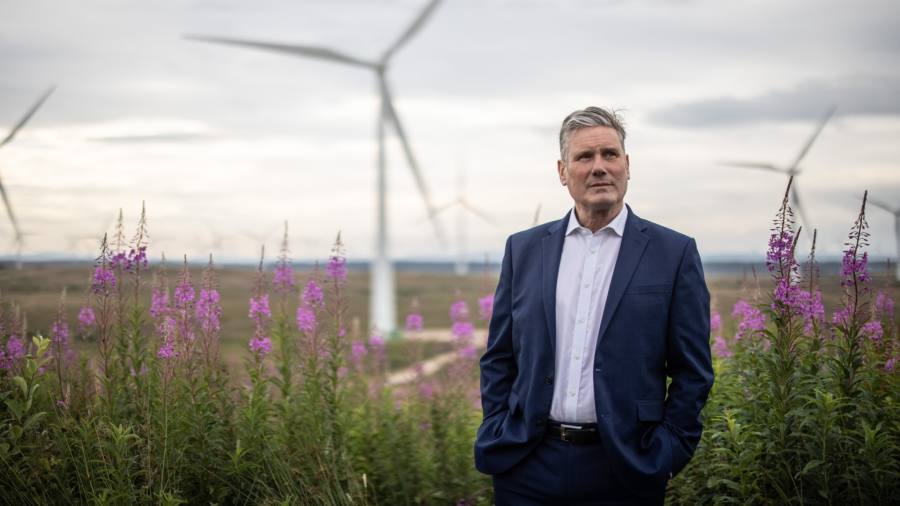
Sir Keir Starmer is facing calls from some senior allies to rebrand the Labour party’s proposed flagship “green prosperity plan” to put more focus on its impact on the UK economy in terms of job creation opportunities and less on climate change.
The Labour leader is coming under scrutiny over his policy platform ahead of a general election expected next year as opinion polls give his party a commanding lead over Britain’s ruling Conservatives.
The policy, which would provide a £140bn stimulus over five years, is by far the main opposition party’s biggest single spending commitment. It would see a Labour government borrow £28bn each year to spend on accelerating the shift towards the UK’s 2050 net zero target by backing projects, including renewable energy schemes and home insulation initiatives
But some senior Labour MPs are concerned that a Labour government is prepared to commit such a large amount of public money to the low-carbon transition and not to other political priorities.
One shadow cabinet member said they wanted the policy renamed to reflect the wider priorities of voters, including job creation and the cost of living crisis, rather than branding it purely as an environmental initiative.
“Voters care more about jobs than green stuff, it was always a mistake to call it the green prosperity plan,” they said, adding that other infrastructure projects could be included in the scheme, such as rail or housing. “A bunch of us are now saying . . . it should be used for capital spending even if not explicitly ‘green’.”
Another Labour MP said: “There’s certainly a growing tension among frontbenchers over the fact that there will be all this borrowing for green schemes and not for things like hospitals and schools.”
Other critics have pointed out that similar schemes in the US and Australia have not mentioned climate change in their titles.
US president Joe Biden “inflation reduction act” is worth $369bn and offers generous subsidies to low-carbon industries. The Australian government has produced a A$15bn “national reconstruction fund” to invest in renewables and other cutting-edge industries.
Gary Smith, general secretary of the influential GMB union, which is one of Labour’s most generous donors, also called on Starmer to focus the scheme on job creation. “We need to stop talking about just transitions and talk about job transitions,” he said.
The GMB leader said he accepted the need for the low-carbon transition but said there should be more focus on nuclear power and hydrogen.
Will Marshall, president of the Progressive Policy Institute, a Washington-based think-tank, said: “It’s taken a while, but centre-left parties in America, Australia and the UK have moved from doom-crying about climate change to stressing the economic benefits of the clean energy transition — namely new jobs and manufacturing opportunities. That’s the right way to reach working class voters.”
Ed Miliband, shadow energy secretary, has said that pouring billions into the green economy can help Britain “win the global race for good jobs”.
Miliband’s spokesman said: “For Ed this is all about jobs. It’s about bills, security, jobs, and climate — in that order. We have always put jobs incredibly high up our priorities. I think everyone in Labour agrees this is first and foremost a jobs plan.”
Party officials said there was no plan to rename the green fund. A spokesperson said: “The Labour party is committed to investing in the industries of the future to bring good jobs and productivity growth to all parts of the country.”